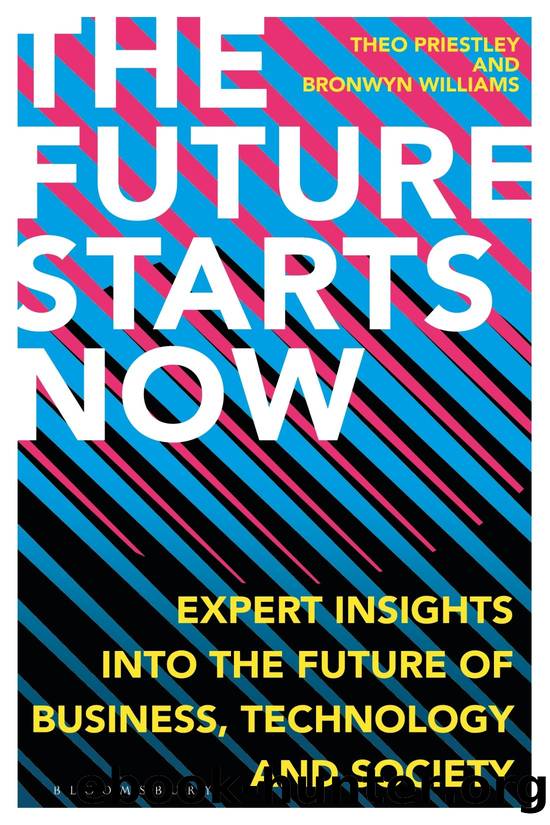The Future Starts Now: Expert Insights Into the Future of Business, Technology and Society by Theo Priestley & Bronwyn Williams

Author:Theo Priestley & Bronwyn Williams [Priestley, Theo & Williams, Bronwyn]
Language: eng
Format: epub
Tags: Business & Economics, Development, Business Development, General, Social Science, Future Studies
ISBN: 9781472981516
Google: fYH8DwAAQBAJ
Publisher: Bloomsbury Publishing
Published: 2021-04-15T23:53:28.939775+00:00
12
The Psychology of Teams
by Duena Blomstrom, keynote speaker, author, co-founder and CEO of Emotional Banking⢠and PeopleNotTech Ltd.â¢
We need to put humans back in charge of business. After all, we â ourselves, our employers, our employees, our suppliers and our customers â are all warm-bodied humans. It is important to remember businesses are built for and by people â even in the increasingly automated economy we find ourselves in. We need to redefine the concept of âteamâ itself to reflect the human side of the companies we build and keep. This chapter explores the possibilities for a more human-centric future of work.
For the past 30 years, there has been an ongoing discussion on the ways in which work will evolve in the future. As we all recognized, we can no longer keep working in the same way as we have since the Industrial Revolution.
The common understanding was that much needed to change â I coined the term âHuman Debtâ⢠(akin to the term âtech debtâ), which refers to the efforts required for employees to be happy and productive at work. In essence, the model in which we would all go to our offices to perform traditional jobs in commonly accepted ways â effectively punching in and out as if it were 1985 â is obviously not sustainable.
There are two primary reasons behind this lack of sustainability: the speed of technology and the expectations of digital consumers. In other words, given how fast we have to employ technology to produce products and services at the speed and quality that consumers expect, the old ways of work have become unfeasible. Everything, from how we employ new workers to the working conditions we provide for them, is poised for extreme change.
Indeed, this change had started to be evident in some segments of the knowledge industry such as software development, where their ways of work had to adapt to fit with the advent of new processes, such as the implementation of Lean theories or Agile practices.
A high concentration of these new ways of working emerged in Silicon Valley, within companies who are showing great success (such as Amazon or Google, who are famously able to efficiently implement new features and remain ahead of their competition), while the rest of the world was slowly starting to take notice and reconsider the ways in which they viewed traditional concepts and conventions of work, when dismissing these outdated approaches seemed to be so efficient for these winners.
We can refer to these winners as the âDigital Eliteâ, a term used in technology reports to designate the type of company that is consistently over-performing and has high degrees of productivity. They all seem to have a lot in common, and most of these commonalities have to do with their extreme focus on people instead of process and their willingness to redefine work in whatever way suits their business goals.
Granted, being digitally native companies gives GAFA (Google, Apple, Facebook and Amazon) and others an almost unfair advantage, but even the
Download
This site does not store any files on its server. We only index and link to content provided by other sites. Please contact the content providers to delete copyright contents if any and email us, we'll remove relevant links or contents immediately.
Zero to IPO: Over $1 Trillion of Actionable Advice from the World's Most Successful Entrepreneurs by Frederic Kerrest(4569)
Machine Learning at Scale with H2O by Gregory Keys | David Whiting(4313)
Never by Ken Follett(3957)
Harry Potter and the Goblet Of Fire by J.K. Rowling(3857)
Ogilvy on Advertising by David Ogilvy(3622)
Shadow of Night by Deborah Harkness(3368)
The Man Who Died Twice by Richard Osman(3079)
Book of Life by Deborah Harkness(2939)
The Tipping Point by Malcolm Gladwell(2922)
Will by Will Smith(2920)
Purple Hibiscus by Chimamanda Ngozi Adichie(2854)
0041152001443424520 .pdf by Unknown(2846)
My Brilliant Friend by Elena Ferrante(2831)
How Proust Can Change Your Life by Alain De Botton(2814)
How to Pay Zero Taxes, 2018 by Jeff A. Schnepper(2655)
Hooked: A Dark, Contemporary Romance (Never After Series) by Emily McIntire(2554)
Rationality by Steven Pinker(2364)
Can't Hurt Me: Master Your Mind and Defy the Odds - Clean Edition by David Goggins(2341)
Borders by unknow(2315)
